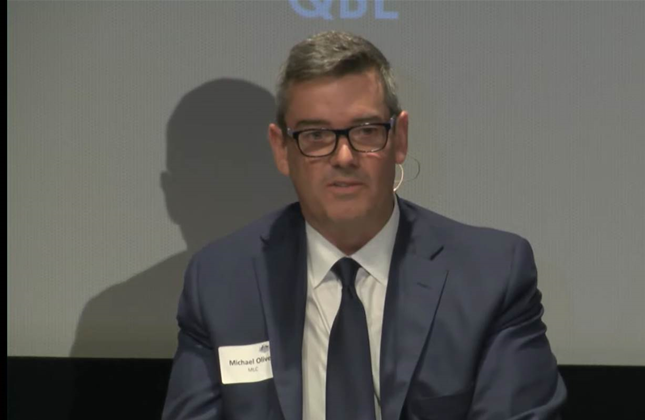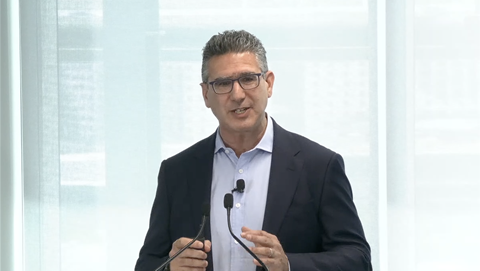MLC Life Insurance is expecting to automate quality assurance for phone-based sales and advice calls by the end of the year following a successful proof-of-concept.

Executive lead for debt protection and partnerships, Michael Oliver, told ASIC’s RegTech voice analytics symposium in Melbourne on Tuesday that phone-based sales of insurance products is “a new capability” for MLC, but one that comes with “an enormous amount of challenges”.
The first challenge is to create a framework to “quality-assure 100 percent of the calls,” Oliver said.
Whereas in the past quality assurance involved employing a team of people to listen to a sample of recorded sales calls to check they comply with Australian law, insurers - together with banks and regulators - have been exploring to what extent voice analytics software may be used to automate this function.
“Given the fact that there can be an enormous amount of calls, and call duration could be anywhere between 20 or 40 minutes-plus, to actually have a lot of people on the phones [making the sales calls] and then to have a separate team of people listening to people on the phones, can be very expensive and very time consuming,” Oliver said.
“Additionally, just by having people deployed to actually listen to those calls, given the very repetitive nature of [the calls], you can still obviously make mistakes when humans are involved.”
Oliver’s second challenge around MLC pursuing phone-based sales is to ensure customers actually understand the policies they are agreeing to buy.
“There is a huge challenge for the industry around customer understanding,” he said.
“Even [with] the best frameworks and the best processes, at the end of the day from a compliance perspective, does that really mean that a customer intimately understands what they've been told, and can they actually comprehend all the requirements of them?”
The insurer’s third challenge is to have a system in place that ensures “everyone is swimming between the flags at all times”, and that the actions of individual salespeople (or teams) do not open the insurer up to regulatory or legal consequences.
“We've seen numerous examples where people have intentionally gone outside of that, or [done it] accidentally trying to help a customer, so making sure that the advice framework absolutely is fit-for-purpose for the license is, I think, a key criteria,” Oliver said.
Oliver said that MLC began exploring voice analytics and speech-to-text software “18 months to two years ago”.
“That culminated at the start of the year with us actually completing a proof-of-concept to actually try and automate our quality assurance program,” he said.
“We got a huge amount of learnings out of that for our general advice team.
“Like any proof concept, there's a whole pile of known knowns and a whole pile of unknown unknowns, so for us, significant learnings that have come out of this for us have resulted in a business case going up, which means we're now in a deployment phase.
“We're looking to deliver the capability [into production] by the end of this year.”
Oliver said he saw automation as a “cost of doing business the right way in the future”.
He noted, however, that automation and voice analytics is still a “growing science” and that there still isn’t a “definitive answer” as to how organisations should implement it.
Some assistance is likely to come from the Australian Securities and Investments Commission (ASIC) in that regard, as the regulator trials voice analytics technology to help its own staff review calls made by banks and insurers for compliance purposes.
Identifying use cases
Oliver saw opportunities in the first instance to automate “the boring, monotonous things that need to be done” on insurance sales calls.
“Whether it's validation questions, reading out a list of, 'are you an Australian resident' and all those things for someone on the phone, whether that takes 10, 15 or 20 minutes, it's easy to miss one or two [questions], and that can have severe consequences,” Oliver said.
“Like anything, I think [it’s about] starting off with the basics, making sure people have the confidence to go through the part of the call that is quite structured and robotic, and if something is missed, it can be easily rectified in real-time or the next day.
“There's lots of problems that we're trying to solve for, and I think the sentiment and the analysis will get there. But right now, just making sure everyone adheres to the basics and follows the process, I think, would be a good start for all of us.”
He believed the technology, applied for sentiment analysis, would ultimately help MLC to “quantify the cost of customer experience”.
“[Today], people [are] sending out huge amounts of surveys to their customers and getting a very poor response rate,” Oliver said.
“By deploying sentiment analysis, pretty much every interaction you have with a customer over the phone is a research point that will tell you ‘How is that product?’ ‘How is that department?’ ‘How is that process actually operating?’
“I hope in five years time, we've really solved for one of the big challenges that I see right now, which is that we have some really good customer experiences that to be honest aren't probably that compliant, and we have some really compliant processes that probably aren't a great customer experience.
“I think there's a huge opportunity to use this technology to develop fantastic customer experiences that are absolutely compliant for everyone. The two don't need to be mutually exclusive.”
Oliver also hoped the technology would provide MLC with some “immediacy” in its ability to recognise any failures in the way products were pitched or sold, and to act more quickly.
“We're not going to talk about problems that we discovered from five years ago or 10 years ago,” he said.
“Hopefully for all of us we'll be able to uncover problems with individuals and teams in days or weeks, certainly not years anymore.
“So hopefully, we actually get the ability to address problems in a much more immediate way, which I think will be a good thing for everyone.”


.png&h=140&w=231&c=1&s=0)








 iTnews Executive Retreat - Security Leaders Edition
iTnews Executive Retreat - Security Leaders Edition
 iTnews Cloud Covered Breakfast Summit
iTnews Cloud Covered Breakfast Summit
 The 2026 iAwards
The 2026 iAwards












_(1).jpg&h=140&w=231&c=1&s=0)



